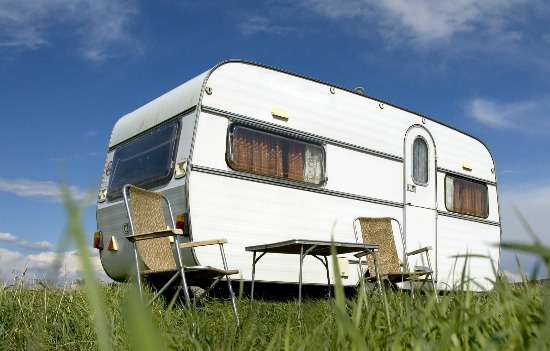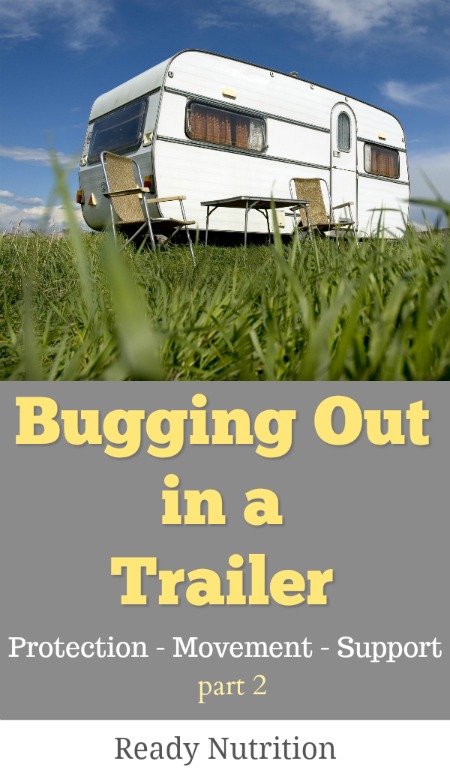
Most of your travel trailers have numerous storage spaces for gear and essentials. This article is not going to cover your Happy Hallmark Bug-Out bags and gear. If you don’t have all your list of supplies, gear, food, medical equipment, etc., there are enough checklists on this site to figure it out. You need to utilize those storage spaces and free space according to the following factors (in order):
- Protection
- Movement
- Support and Sustainability
Protection
It is as plain as the word. The defense of your family in either a moving or static (stationary) posture is protection. I’m not going to fool around with laws for Fisher-Price land, such as multiple gunlocks and cables for states such as California or Massachusetts, or transport laws that will jail you and confiscate your weapon, such as Maryland. We’re dealing with either an emergency situation that requires your immediate evac or a grid-down collapse “adventure” catalogued for you in pop culture ad infinitum. Driver and “co-pilot,” if applicable each need to have a mounted, immediately accessible firearm, bare minimum a pistol, fully loaded and ready to rock and roll.
Whether moving or static, each member of the family that can use a firearm needs to have an assigned area of the camper they can move to and take responsibility to defend. Sound stupid? You should have seen what the gangs did to those in happy family campers after Hurricane Andrew in Florida or Hurricane Katrina in New Orleans. Needless to say, the trailers changed ownership. If it is worth having (a trailer, a family, etc.), it should be worth it to you to defend. All four directions/sides of the camper need to be covered.
Each side needs to have a weapon positioned and accessible, loaded and with plenty of ready, filled magazines and/or speed loaders. Do not forget your support equipment for protection and defense, such as Night Vision Devices (NVDs), binoculars with rangefinders, high-speed, high lumen flashlights (such as the Fenix TK-25 we covered in another piece), and emergency comm gear such as Motorolas. Once again, equipment is not a substitute for drills and practice. Prior to a disaster, you have to cover everyone’s responsibilities, practice dry runs through them in drills, and establish the ROE (Rules of Engagement) by each member.
Trailers are pretty light-skinned, so you may either want to reinforce them with some kind of bullet resistant Plexiglas or steel, and/or “deck” out the entire family in bulletproof vests. A good one (Level III or IV) will set you back about half a grand. Once again, it depends on how much you value your family’s protection: it’s on you.
Movement
This has to do with taking care of things from a logistical perspective. For Mr. and Mrs. Hallmark and the two kids, this is more than just piling up equipment. Once again, everyone needs assigned areas of responsibility. Cleanup and stowing away of all materials, and securing things that may be on the exterior, such as bikes on racks, and tents or tarps, in side compartments or strapped to the top. I also emphasize here that you should have at least two tarps that will be able to be used to cover the trailer if necessary. We’ll get into this more in a minute.
It also means checking out the batteries, fluids, and condition of high-wear items, such as tires, seals on doors, windows, and hatches, and filters for air and oil. A maintenance log will help you out on this; however, it is no substitute for putting “eyes on” everything and verifying what’s on the sheet. Top off on your coolants and fluids before you roll out. Make sure that first aid gear and kits are all in order and that everyone knows where they are and how to use them.
Support and Sustainability
This is where you concentrate on making the trailer into a home…one that may be permanent for a while in a short or long-term disaster. Remember those tarps? If you can stretch them overhead to cover your vehicle and attach with bungees…using some poles with spreaders to support from underneath, you’ve increased your protection. Keep off the snow, rain, excess sun, and so forth. Remember to “slant” the tarp or tarps to enable runoff of water or snow.
This is where you will be determining what to do for cooking: whether to use the propane for your trailer’s stove or to break a small grill out from the storage compartments. Access the season and access your family’s needs. Assign regular duties to each family member that rotate, except in the area where specialization is needed for one to have as a permanent task. Even with these people (such as a mechanic in the family, or a computer tech), they still need to clean the dishes one night and cook another night. Don’t foster resentment through perceived (even if incorrect) favoritism.
During the winter months (especially in areas that it is colder, such as here in Montana) it may be necessary to construct an apron around the outer edges of the trailer and further insulate the sides and bottom. If your propane reaches its end, I have written articles in the past on “rocket” stoves and other smaller woodstoves. You may have to convert that moving trailer by running a pipe out the window so that you can burn wood in a small woodstove.
Hey, here in Montana I see others doing it all the time. Just remember to measure the stove’s pipe, and pick up a double-flue pipe with an exterior and interior section, and make sure it’s angled and not at a 90-degree angle going out of a window. Chimney fires are serious, and you don’t want to allow creosote to build up at all.
You’ll need to have a place that you intend to go, preferably someplace with little or no people as opposed to the “World War Z/Planet of the Apes” scenario. This will take proper planning on your part, and a thorough map and ground reconnaissance prior to the football kicking off with the disaster. Proper planning and practicing the scenario will increase your chances. Keep in mind: if you can reach a place, so can others. It is then that you will rely on your intelligence, prior training, teamwork, and family cohesiveness to make it through. Stay in that good fight. JJ out!


Don’t forget to put solar panels on the roof, and make an awning out of more solar panels. Electrical power is one thing you can never get enough of in any kind of “camping” situation.
Lights, fans, a/c, microwave, water heating, battery charging, space heater, radio, tv, internet, phone, electric blanket, foot-warmer pad, pet warmer pad, etc etc.
Stay in your home. The government occupation forces won’t allow people driving around with trailers.
J.J. wise counsel as always, didn’t think about the wood burning stove for the trailer – Thanks Tight 360 – 24/7